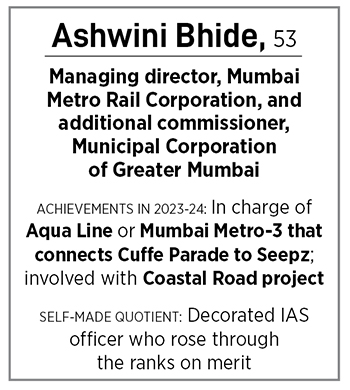
IAS officer Ashwini Bhide: Changing an ecosystem
IAS officer Ashwini Bhide has been the driving force behind Metro-3 and other notable infrastructure projects in Mumbai. She believes a clear dialogue can solve the most complex problems and advocates women to show up to change the ecosystem
 Ashwini Bhide, Managing director, Mumbai Metro Rail Corporation, and additional commissioner, Municipal Corporation of Greater Mumbai
Image: Mexy Xavier
Ashwini Bhide, Managing director, Mumbai Metro Rail Corporation, and additional commissioner, Municipal Corporation of Greater Mumbai
Image: Mexy Xavier
Ashwini Bhide speaks her mind without fear. The 1995 batch Indian Administrative Services (IAS) officer reveals that there have been times when she’s had serious altercations with seasoned politicians on the field, but she’s held her ground if she felt she was right.
“It has been a life-changing experience. It’s a big project, involving the island city, with an underground network and 27 stations, that required a lot of interventions—socially, location-wise and infrastructure-related. It needed a lot of energy and patience. Many old learnings came handy,” says Bhide, 53, who helmed big-ticket projects such as the Eastern Freeway, Sahar Elevated Road, Monorail-Phase I and various flyovers during her tenure with the Mumbai Metropolitan Region Development Authority (MMRDA). “From Mumbai’s perspective too, Metro-3 is going to be a game changer.”
 Her ability to communicate came to the fore when there was stiff opposition from environmentalists over the cutting of trees to build a car shed for Metro-3 at Aarey, a suburban area with green cover. “Sometimes dialogue is the way out with people. But when the dialogue is over and you can’t go beyond a certain limit, the courts are the answer,” she says about dealing with the standoff that resulted in over 90 litigations. “It’s always better that a third party intervenes and sees whose point is right in the larger scheme of things.”
Her ability to communicate came to the fore when there was stiff opposition from environmentalists over the cutting of trees to build a car shed for Metro-3 at Aarey, a suburban area with green cover. “Sometimes dialogue is the way out with people. But when the dialogue is over and you can’t go beyond a certain limit, the courts are the answer,” she says about dealing with the standoff that resulted in over 90 litigations. “It’s always better that a third party intervenes and sees whose point is right in the larger scheme of things.”R Ramana, director, planning and real estate development, MMRC, who has known Bhide for 15 years, says she deals with everyone with respect. “She is a thorough, upright and clean administrator. She studies all problems in-depth, gives her time to hear the stakeholders’ views and grievances, and tries to give a comprehensive solution where common citizens get their rightful benefits,” he says.
Also read: Anshula Kant: From SBI to the World Bank
Bhide’s single-minded focus to meet her goals is a trait she’s had since her formative years. She belongs to a middle-class family—her father worked with the State Bank of India, a job with transfers, and mother was a homemaker—in Western Maharashtra, and studied in Marathi-medium schools in small villages. “We had people from all strata of society, mainly from rural areas. As a result, there was realistic grooming,” says Bhide, who stood in the merit list in SSC, and did her BA in literature from Willingdon College in Sangli. While pursuing her postgraduation in Pune, she began preparing for the Maharashtra Public Service Commission and UPSC exams.
A relative who worked at the Mantralaya had informed her about IAS as a career option. “The usual route for meritorious students was medical or engineering. But I thought I should do something different,” says Bhide, adding that the journey began when she was 15, and challenges included information deficit in an era without internet. “Aspirants like us from rural areas and smaller towns did not have the resources,” she says.

Once the hurdle was crossed, though, she learnt everything on the job—from understanding human behaviour to dealing with various stakeholders: Politicians, citizens, citizen groups. Her initial stints as assistant collector in Kolhapur district, CEO of Sindhudurg district and CEO of Nagpur Zilla Parishad saw her handle labour problems, industrial unrest and disaster management, among other issues.
She says there are both challenges and advantages of being a woman IAS officer. “People shower a lot of love because they see such few lady officers. And the expectations are high—she should be considerate, sensitive and understanding. And we must respond to that positively,” says Bhide, who is involved with the Coastal Road project in Mumbai too. The system, though, she concedes, is male-dominated, and the struggle began from having washrooms for women. “There are tough decisions that you take, but people don’t expect that from women officers. There is a patronising attitude. As you move up the ladder, there is a glass ceiling that one encounters… that’s because there is a political role that increases.”
Click here for W-Power List 2024
Whenever there is an impasse, she says she takes the lead in proactively talking to politicians, and stresses on the need for “bridge-building”. “At times, there can be pure denial from the political representative about having a female officer… the comfort level about women officers among political leadership is less,” she says, adding that irrespective of one’s gender, one needs to be a good officer.
“Ashwini handles male ego and male-centric work environment efficiently… she is able to master that,” says Ramana, adding that she’s tech-savvy, an avid reader who reads both English and Marathi literature, and a fast learner.
Bhide, who also enjoys watching films and documentaries, listening to classical music, and attending cultural programmes, emphasises that more women need to show up as only then the ecosystem can change. “Organisations need to create a conducive atmosphere for women. And women too, irrespective of the atmosphere, should take it as a challenge and step up. As the number increases, things change,” says Bhide, who describes herself as a democratic leader, but a hard taskmaster, who is outcome-oriented and believes in team building.
(This story appears in the 22 March, 2024 issue of Forbes India. To visit our Archives, click here.)
Post Your Comment


















